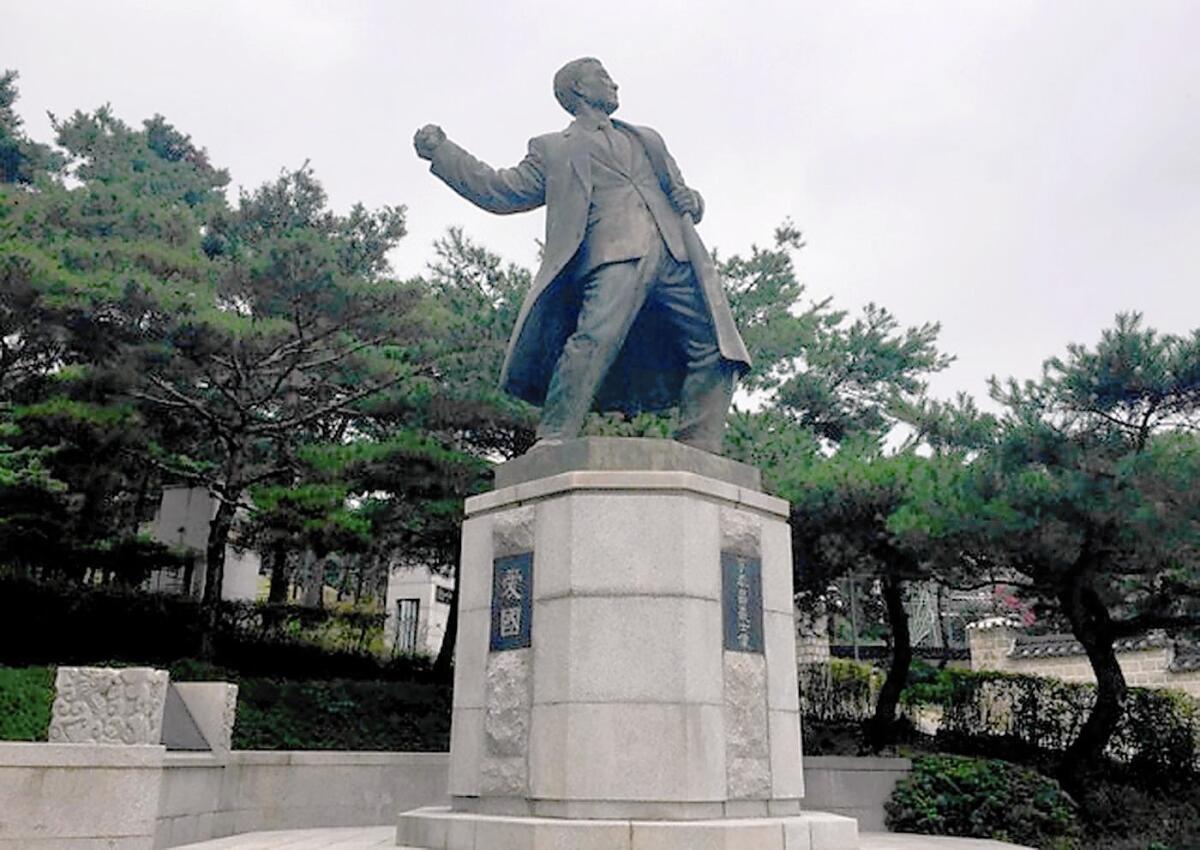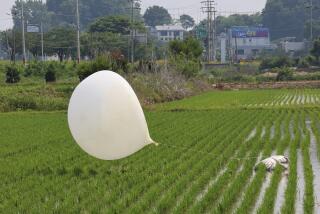Koreans bow to heroes of the 1930s

Lee Bong-chang’s statue in Hyochang Park in Seoul. In 1932, Lee threw a grenade toward Japanese Emperor Hirohito in an assassination attempt.
A statue of a Korean man with a grenade in his right hand, winding up for the throw, looms over Hyochang Park in Seoul. The bronze figure, dressed in a Western-style suit and knee-length overcoat, is Lee Bong-chang, known for his attempt to assassinate Japanese Emperor Hirohito by throwing a grenade at his horse carriage in 1932.
Korea was a Japanese colony from 1910 until Tokyo’s World War II surrender in 1945, and Lee was part of a group who fought the occupation.
Hirohito escaped the attack unharmed, and Lee was captured and hanged. Lee is interred at Hyochang Park along with Yun Bong-gil and Baek Jeong-gi, two others who violently resisted the Japanese. Of them, Yun is the only one who achieved his objective, killing several Japanese dignitaries with a bomb in Shanghai in 1932.
Their collective resting place is called the Graves of the Three Martyrs. They are lionized in South Korea as selfless figures who sacrificed themselves for the freedom of the nation.
The story of Korea’s independence activists and their tactics has been brought to the screen this summer in the film “Assassination.” It tells the story of a plot by a group of Koreans who come to Seoul from their base in China in the 1930s to kill a Japanese military commander and a rich Korean businessman with close ties to the imperial leadership. Their plans unravel in a series of betrayals.
Directed by Choi Dong-hoon, best known for the 2012 blockbuster “The Thieves,” “Assassination” has notched huge box office numbers, bringing in more than $42 million in South Korea since opening on July 22, according to Korean Film Council data. On Friday, “Assassination” will open in major U.S. cities, including Los Angeles.
South Korean moviegoers are in the mood for such historical stories this year, which marks the 70th anniversary of the end of World War II and of Japan’s dominion over Korea. Every Aug. 15, Liberation Day, both South and North Korea celebrate the peninsula’s independence from Japan.
“Not many films about the Japanese colonial period are made in South Korea because directors think they cost a lot and that it’s hard to get attention from audiences,” Choi said in an interview. He said he hopes his film will raise awareness of the Japanese occupation, particularly among young people.
On an afternoon in late July, Hyochang Park’s air was thick with the humidity of monsoon season. Groves of pine trees gave the park a sensation of woodsy respite from the noise and smog of Seoul, a crowded city of more than 10 million.
Hwang Seong-ho, a 20-year-old from Jeonju, a mid-sized city a few hours south of the capital, was visiting Seoul to see a few historical sites during his summer break from college and stopped by the park. He slowly approached the statue of Lee, then bowed.
“He was of course a great person,” Hwang said. “The only bad thing was that he failed to carry out the assassination.”
Activists of Lee’s era drew inspiration from An Jung-geun, a Korean who assassinated Ito Hirobumi, then Japan’s governor general of Korea, in 1909. An killed Hirobumi at a train station in Harbin, a city in northern China that later suffered under Japanese occupation. Last year, China and South Korea jointly erected a memorial to An in Harbin.
“Assassination” depicts the Korean characters as dogged and selfless, risking their own safety for their nation’s freedom. The Japanese are shown as heartless, with a Japanese military official boasting about how many Koreans he has killed. In another scene, he shoots down a young Korean servant after she accidentally drops a vase of flowers.
When putting their plans together, the would-be Korean assassins speak in hushed voices about having witnessed atrocities by the Japanese army. One, a sniper played by Gianna Jun, describes her mother as having been “fortunate” to have died of a gunshot wound.
“The others were ripped open with knives, beaten to death with clubs, strangled, burned in fires, buried alive, even boiled in caldrons,” she says.
The Japanese were not Korea’s first occupiers. Throughout its history, the Korean peninsula has been invaded many times by Chinese and Mongol armies. But those empires ruled indirectly through Korean royalty, while the Japanese dispatched a governor-general to administer the territory.
The Japanese administration also took measures to snuff out Korean language and culture, making Japanese the official language of business and education and requiring that Koreans use Japanese names at work or school. And Korean “comfort women” were forced to work in brothels for the Japanese military during World War II, a painful memory that remains a divisive issue between the two countries.
Although the occupation ended 70 years ago, the legacy of humiliation still factors into how South Korea defines itself.
“Korea is a divided country with a nationalist narrative. It builds patriotism by looking to Japan,” said Robert Kelly, an associate professor of political science at Pusan National University.
In the coming weeks many Koreans will visit Hyochang Park to pay tribute to Lee and his comrades.
“They went after government and military leaders, not civilians. Most people feel like that’s justified,” said David Mason, a Korean-history scholar at Chung-Ang University in Seoul.
Near a park entrance, dozens of elderly men gathered around a cluster of picnic tables, chatting and playing janggi, a Korean game similar to chess. A chorus of cicadas in the trees almost drowned out the sound of wooden pieces clacking against the boards.
Lim Jung-nam, 85, comes to the park to play janggi each morning and often stops by the Graves of the Three Martyrs. “They were real patriots,” Lim said. “As my own life drags on, I get strength from their example.”
Borowiec is a special correspondent.
ALSO:
Two trains derail in India; at least 24 killed, 300 rescued
Civilian casualties hit new high in Afghanistan
Man in China gets 12-year term for putting anti-Communist slogans on TV
More to Read
Sign up for Essential California
The most important California stories and recommendations in your inbox every morning.
You may occasionally receive promotional content from the Los Angeles Times.










